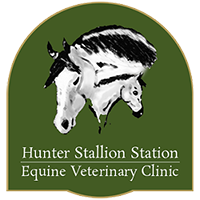
Vaccination and Deworming
Vaccination & Deworming for Adult Equines
Any horse that has not been previously vaccinated with any of the below vaccines should consult with their veterinarian as some vaccines may require boosters.
Fall
- Rabies
- Rhino(EHV)
- Influenza
- Strangles
- Check/Float Teeth
- Fecal
Spring
- Eastern & Western Encephalomyelitis
- Tetanus
- Influenza
- Rhino(EHV)
- Strangles
- West Nile
- Fecal
Please pay attention to which diseases you are vaccinating for when using the 3, 4, and 5-way shots:
- 3-way includes Eastern & Western Encephalomyelitis & Tetanus
- 4-way includes everything in the 3-way plus Influenza
- 5-way includes everything in the 4-way plus Rhino
Timing and frequency of vaccinations:
- Rabies should be given annually
- Influenza and Rhino should be given every 6 months
- West Nile, Tetanus, Eastern & Western Encephalomyelitis can be given once a year as long as it is given in the late spring or early summer
- Strangles is recommended every 6 months
For broodmares, foals, and weanlings please see our pregnant mare/foal vaccination schedule.
Recommended Deworming Schedule:
Fecal egg count should be done at least twice a year prior to deworming. If eggs are found repeat fecal 2-4 weeks after deworming to check for resistance to deworming product.
- Quest – December/January
- Ivermectin Gold (With tape worm medication) – March*
- Ivermectin (Can also use Strongid or Anthelcide) – May/June*
- Panacur Power Pack** (Or Fenbendazole) – August/September
*If fecal egg count is negative prior to March, Ivermectin Gold can be given once between March and June, followed up by the August/September deworming.
**For panacur power pack’s & fenbendazole, use a double dose daily for 5 days.
Recommended Vaccination & Deworming Schedule for Foals:
Age: Birth to 48 hours
- E. Coli endotoxin, Tetanus Antitoxin, Check IgG Level
- No Deworming
Age: 2 months
- No Vaccination Recommended
- Use Strongid for Deworming
Age: 3 months (Note: If mare has not had pre-foaling vaccines, then start vaccinating the foal at 3 months of age instead of 6 months, or if your foal was born in April-June start at 3 months)
- No Vaccination Recommended
- Use Ivermectin for Deworming
Age: 6 months
- Eastern & Western Encephalomyelitis, Tetanus, Rhino(EHV), Strangles, Rabies, Influenza, West Nile
- Fecal and Quest
Age: 7 months
- Eastern & Western Encephalomyelitis, Tetanus, Rhino(EHV), Strangles, Rabies, Influenza, West Nile
- No Deworming
Age: 10-12 months
- Follow adult vaccination protocol: Eastern & Western Encephalomyelitis, Eastern & Western Encephalomyelitis, Tetanus, Rhino(EHV),
- Influenza, West Nile
- Follow adult deworming and fecal protocol
- Quest
Vaccination Schedule for Pregnant Mares’
Stage of Gestation:
Pre-Breeding
- Eastern & Western Encephalomyelitis
- Tetanus
- Rhino(EHV)
- Influenza
- Strangles
- West Nile
- Rabies
- Check Teeth
5 Months
- Influenza
- Rhino(EHV)
7 Months
- Influenza
- Rhino(EHV)
9 Months
- Influenza
- Rhino(EHV)
10 Months/Pre-Foaling
- Eastern & Western Encephalomyelitis
- Tetanus
- Rhino(EHV)
- Influenza
- Strangles
- West Nile
- Rabies
7-10 Days Post-Foaling
- Uterine Culture, even if not breeding back
- Note: Rhino(EHV) – Use Prodigy or Pneumabort K
Recommended Deworming Schedule:
Follow the normal adult deworming schedule (below.) Fecal egg count should be done at least twice a year prior to deworming. Deworm approximately 1 month prior to foaling and within 1 week post foaling or based on fecal egg count.
- Quest – December/January
- Ivermectin Gold (With tape worm medication) – March*
- Ivermectin (Can also use Strongid or Anthelcide) – May/June*
- Panacur Power Pack** (Or Fenbendazole) – August/September
*If fecal egg count is negative prior to March, Ivermectin Gold can be given once between March and June, followed up by the August/September deworming.
**For panacur power pack’s & fenbendazole, use a double dose daily for 5 days.